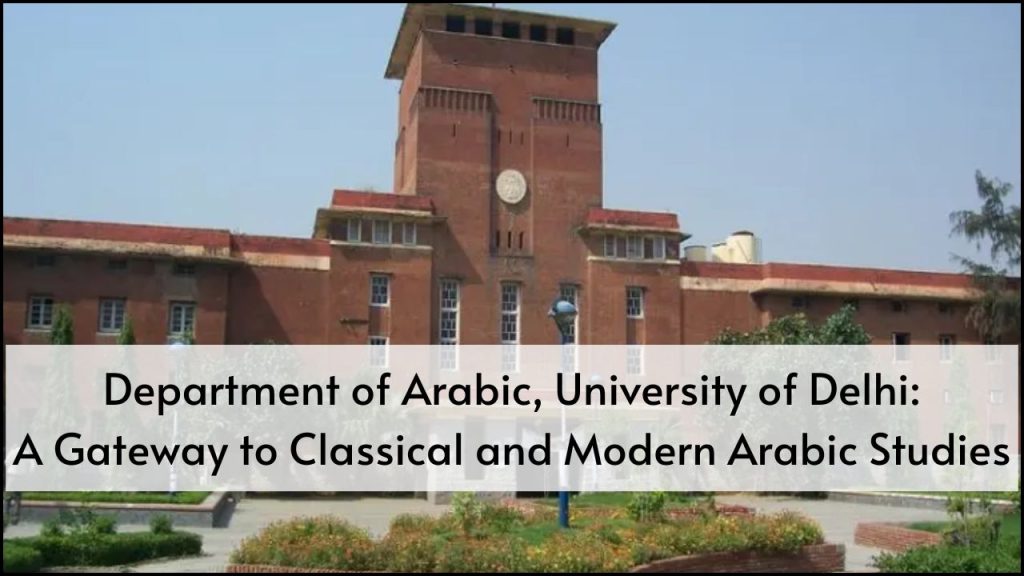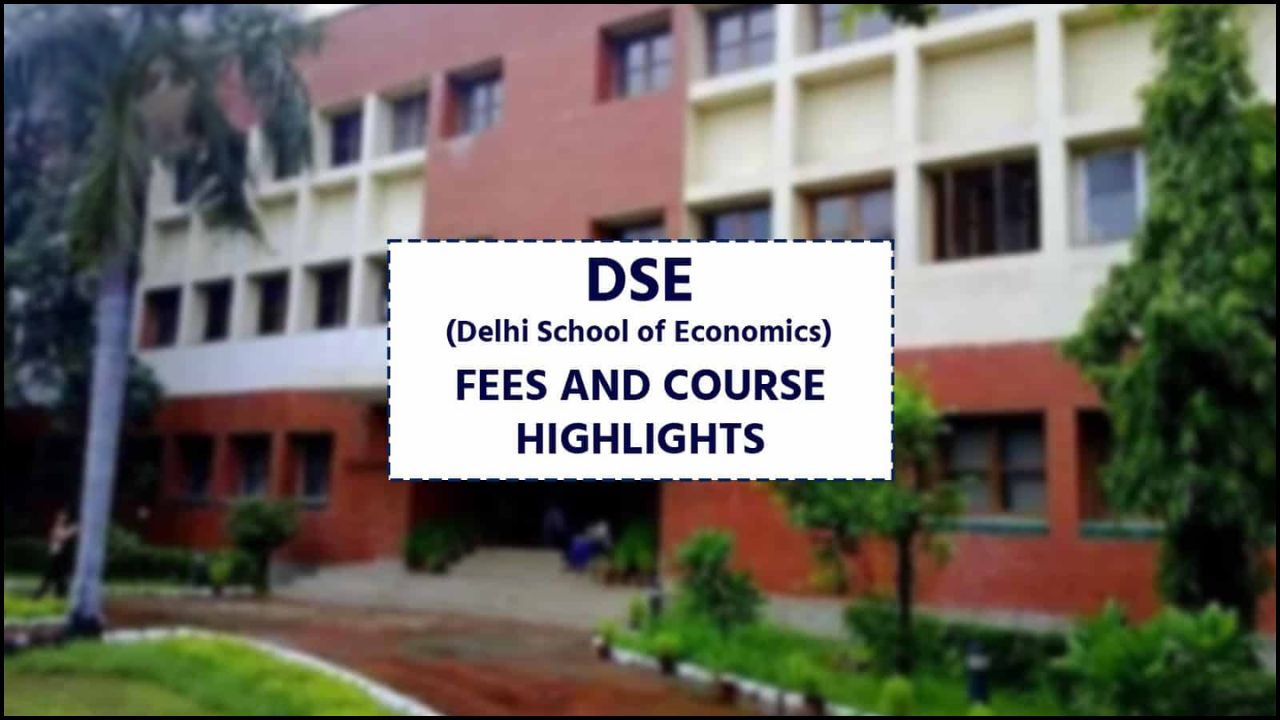
The Department of Arabic at the University of Delhi stands as a beacon of excellence in the study and promotion of the Arabic language, literature, culture, and history. Established with the vision of fostering cultural and academic ties between India and the Arab world, the department has evolved into one of the leading centers of Arabic studies in South Asia.
Whether you are a language enthusiast, aspiring diplomat, translator, or scholar of Islamic and Middle Eastern studies, the Department of Arabic at DU offers robust academic programs and research opportunities.
Table of Contents
Historical Background
The Department of Arabic was established in 1922, the same year the University of Delhi came into existence. Since then, it has played a vital role in preserving and promoting the Arabic language and literature in India.
The department initially began with undergraduate teaching and slowly expanded to include postgraduate and research programs. Today, it is one of the few departments in India with comprehensive academic offerings in Arabic.
Objectives of the Department
The core goals of the Department of Arabic are:
| Objective | Description |
|---|---|
| Language Proficiency | Train students in reading, writing, and speaking Arabic. |
| Literature & Culture | Introduce classical and modern Arabic literature. |
| Translation Skills | Develop professional translators for public and private sectors. |
| Intercultural Dialogue | Promote understanding between Indian and Arab cultures. |
| Research Development | Foster research in linguistics, classical texts, and modern issues. |
Academic Programs Offered
The department offers a range of programs for both language learners and researchers.
Courses Offered
| Program Name | Duration | Eligibility |
|---|---|---|
| B.A. (Hons) in Arabic | 3 Years | 10+2 or equivalent |
| M.A. in Arabic | 2 Years | B.A. (Hons) or B.A. with Arabic |
| Ph.D. in Arabic | Minimum 3 Years | Master’s in Arabic with entrance test |
| Certificate in Arabic | 1 Year | 10+2 or equivalent |
| Diploma in Arabic | 1 Year | Certificate in Arabic |
| Advanced Diploma in Arabic | 1 Year | Diploma in Arabic |
Curriculum Highlights
The curriculum blends classical and modern Arabic content with practical applications:
| Course Component | Key Topics Covered |
|---|---|
| Classical Arabic | Quranic Arabic, Hadith, Classical poetry, prose |
| Modern Arabic | Phonetics, syntax, and morphology of Arabic |
| Translation Studies | Legal, technical, literary translation |
| Linguistics | Phonetics, syntax, morphology of Arabic |
| Area Studies | Arab history, politics, society, and economics |
Research Opportunities
Research in the department focuses on a wide range of subjects:
- Comparative Arabic Literature
- Arabic-Urdu Literary Relations
- Islamic Philosophy and Theology
- Arabic Linguistics and Lexicography
- Translation Theory and Practice
- Arab Civilization and Indian-Arab Relations
PhD scholars have access to ancient manuscripts, libraries, and resources in both physical and digital formats.
Collaborations and Exchange Programs
The Department of Arabic fosters collaborations with institutions in India and abroad.
| Institution / Country | Type of Collaboration |
|---|---|
| King Saud University, Saudi Arabia | Faculty Exchange, Joint Seminars |
| Al-Azhar University, Egypt | Islamic Studies and Research |
| Indian Council for Cultural Relations (ICCR) | Scholarships and Cultural Exchange |
| Embassy of Oman, UAE, Iraq | Arabic Language Promotion Programs |
Infrastructure and Library Resources
The department is located in the Faculty of Arts Building on the North Campus of the University of Delhi.
Library Highlights:
- A large collection of Arabic manuscripts and books
- Subscriptions to Arabic periodicals and journals
- Access to digital databases and archives
- Journals on Islamic, Middle Eastern, and Arab studies
Career Prospects for Graduates
A degree from the Department of Arabic opens up several professional avenues:
| Sector | Job Roles |
|---|---|
| Government (MEA, Defense) | Interpreter, Translator, Analyst |
| Academia and Research | Lecturer, Research Scholar, Writer |
| Media and Journalism | Arabic Content Writer, News Analyst |
| International Business | Export-Import Executive, Liaison Officer |
| Tourism and Hospitality | Tour Guide, Travel Consultant |
| NGOs and International Orgs | Language Specialist, Cultural Advisor |
Notable Alumni
Many alumni have gone on to hold important positions in:
- Ministry of External Affairs
- Indian Army’s Language Division
- Jamia Millia Islamia, AMU, and other universities
- Arabic media channels and translation bureaus
Departmental Activities
The Department of Arabic is known for organizing numerous academic and cultural activities:
| Activity Name | Description |
|---|---|
| Annual Arabic Fest “Nadi Al-Arabi” | Cultural performances, poetry, debates |
| National Seminars | Themes on Arabic literature, linguistics |
| Translation Workshops | Training on real-time and literary translation |
| Guest Lectures | Talks by Arab scholars and diplomats |
These events foster a deeper engagement with Arabic heritage and contemporary thought.
Admission Process
Admission to Arabic programs follows the University of Delhi’s centralized process:
For UG Courses (BA Hons):
- Based on CUET-UG scores
- Language-specific sections for Arabic
For PG Courses (MA Arabic):
- Based on DUET or CUET-PG exam
- Merit-based for DU graduates (limited seats)
For PhD:
- Written test + Interview
- NET/JRF qualified candidates get preference
Why Choose Arabic at DU?
- Rich Heritage: One of the oldest Arabic departments in India
- Experienced Faculty: Professors with international exposure
- Diverse Curriculum: Covers classical, modern, and functional Arabic
- Career-Oriented: Strong demand in public and private sectors
- Cultural Exposure: Seminars, lectures, and exchange programs with Arab countries
Quick Guide
Q1. Is knowledge of Urdu required for Arabic studies at DU?
No, but it may help in understanding classical texts.
Q2. Does DU offer short-term Arabic language courses?
Yes, certificate, diploma, and advanced diploma courses are available.
Q3. Are Arabic degrees from DU recognized internationally?
Yes, DU is a UGC-recognized institution with global credibility.
Q4. Can I pursue an MA in Arabic without a BA in Arabic?
Yes, but you may need to pass a proficiency test or a bridge course.





